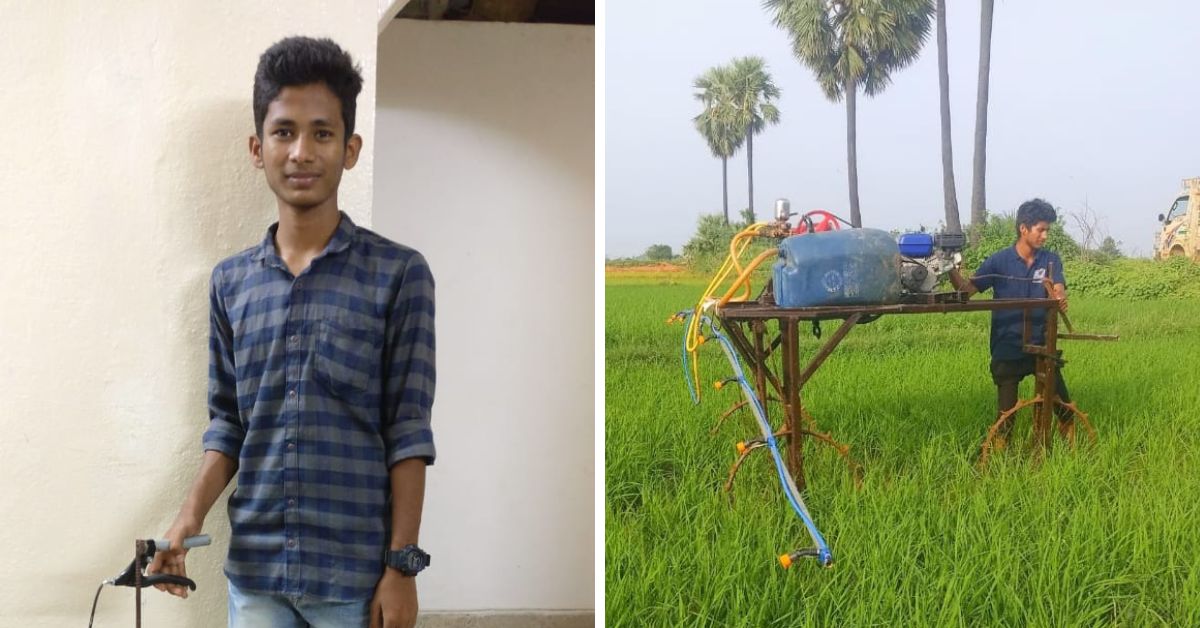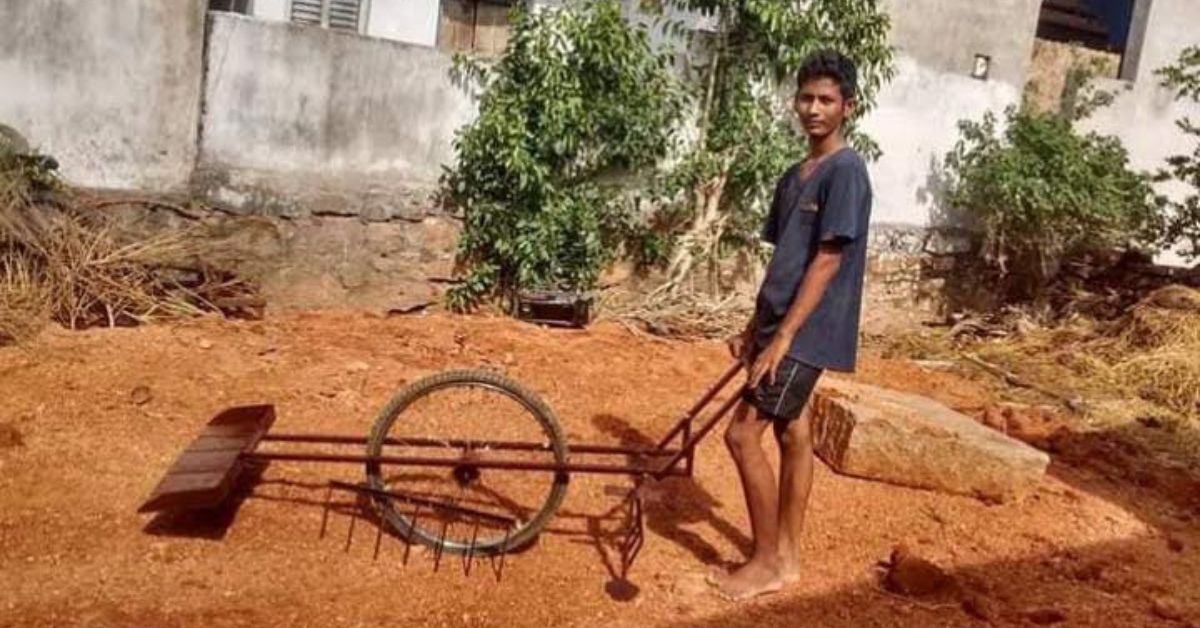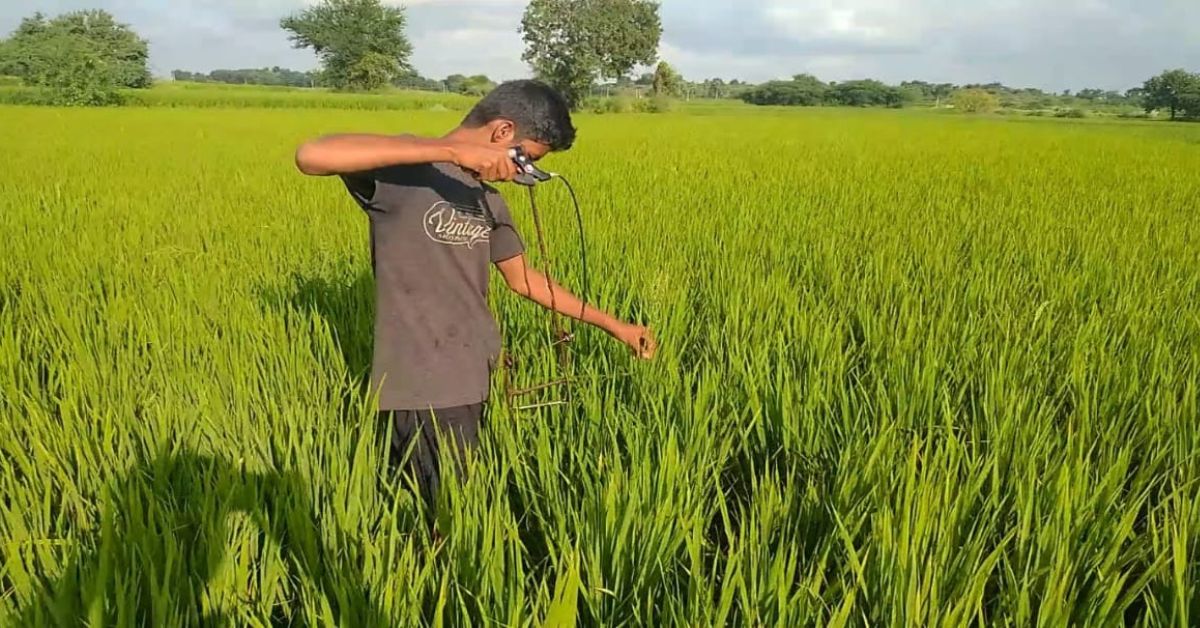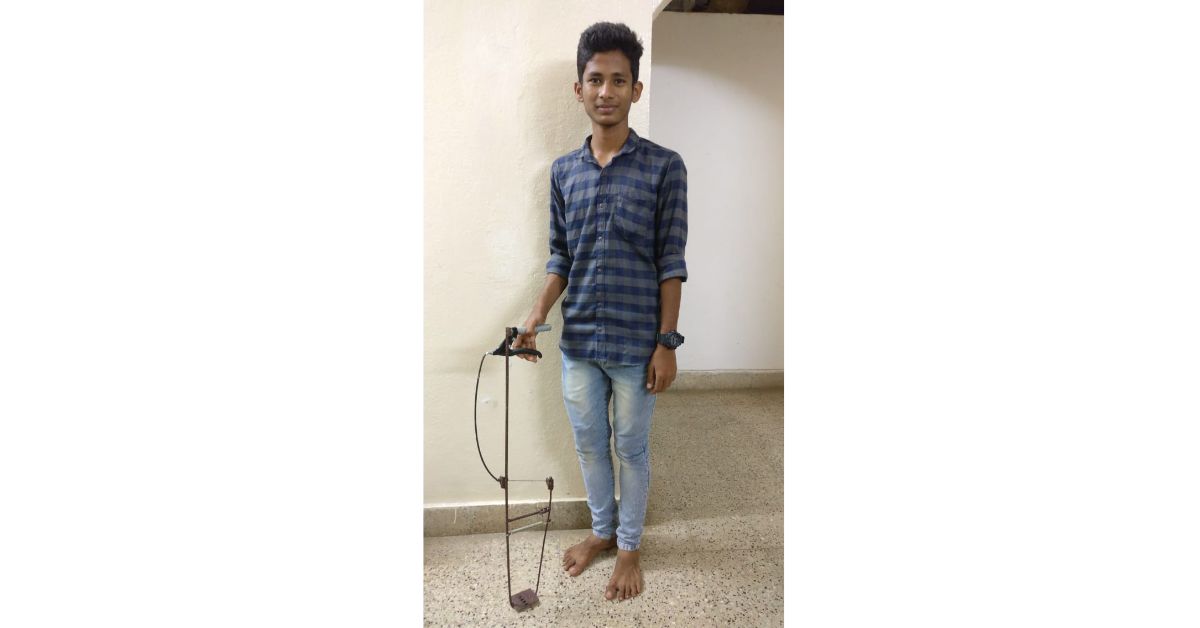19-YO’s Low-Cost, Seed-Sowing Innovation Eases Back-Breaking Task for Farmers
Gorre Ashok, a young inventor from Telangana, comes from a farming family. His innovations aim to solve the plight of farmers.

At 17, Gorre Ashok needed Rs 42 to get from Telangana’s Devarakonda to Nalgonda so he could prove his mettle as an innovator at an exhibition where original creations were presented. The district science officer would be present, and after three years of staying away from innovations and focusing on his studies, Ashok was now setting out toward something he’s always been passionate about.
“I didn’t have the money so I borrowed exactly Rs 42 from my friends,” he says in an interview with The Better India. “I didn’t have good clothes either, so I borrowed those from my friends too,” he adds.
At the exhibition, his innovation was a set-up that showed the effects of smoking on the lungs. He had taken a transparent plastic bottle, filled it with water, and created holes at the base of the bottle and on top of the lid. Through the top hole, he inserted a lit cigarette, and let the water flow down through the bottom hole, showing how the addiction dehydrates a body as the smoke fills up the lungs. He then removed the bottle cap and placed tissue paper at the mouth of the bottle. From the hole at the bottom, he breathed into the bottle, causing the smoke to collect upward and stick to the tissue, leading to a change in its colour. “That’s how it sticks to the tissues in the lungs,” he says. “Everyone appreciated me for making this.”
He won first place for this innovation. However, the primary thought in his head wasn’t one of excitement but of concern. He had no money to get back home. “I was preparing to ask the district science officer if I could have Rs 42 to go home,” he recalls. It was then that the officer and a few teachers present at the exhibition came together and gave Ashok a sum totalling Rs 3,500, as a show of support toward him. The next day, his story was in the local papers with a photo of him and the officer.
Today, the innovator has eight innovations to his credit, which includes a seed sower that he sells for Rs 850 apiece.
He claims to have helped 86 farmers so far.

Of competitions, challenges, and smart innovations
Born to a farming family in Anjalipuram, a small village in Telangana, Ashok was always interested in innovating. As a child, he used to make toys from pipes and other waste material he could find. “We didn’t have enough money to buy toys, so I started making them myself,” says the now 19-year-old.
The opportunity to showcase his first real innovation came when he was in class 6. The local school he was studying at was set to participate in a district-level science competition and had chosen Venkatram, a science student, to represent it. He, however, wasn’t keen on going. So Ashok’s biology teacher told him to go instead, using the selected student’s name. Here, Ashok won first place for his hydraulic JCB crane. “I got a certificate but it’s not in my name. After that, my interest in inventions increased a lot.”
A constant challenge for Ashok has been the lack of support to pursue a career in creating innovations. “My family and the villagers didn’t understand what innovations are or why they’re important,” he says. Instead, he was pushed to focus on his formal education and on being a bright student. “‘If you study today, you will become great one day,’ they used to say,” recalls Ashok.
But after tasting success with innovations, his interest in book learning dwindled, and he soon dropped to the last rank in his class. His father decided to shift him to a private hostel where he could be more focused on his lessons. “Everyone there was focused on studying, and no one was encouraging activities like innovations.” For three years, from classes 8 to 10, he didn’t create any innovations, focusing only on his studies.
A lack of funds has always been a big challenge for Ashok, a problem that reared its head when he was trying to decide what to do after class 10. He couldn’t enrol himself in a private institute, instead pursued a course in Vocational Agriculture at the Devarakonda Vocational Junior College. “But I realised that I couldn’t change my life here,” he says.

It was during one of those days, when he was looking for other avenues, that he stumbled upon a newspaper clipping asking readers if they wanted to meet the district science officer. If yes, they could participate in an innovators’ exhibition. “I know the importance of opportunity. Even one small opportunity can change your life,” he says.
Farmer-first approach
After completing class 12, his family asked him to take up a job at a chemical pesticides company, sticking it out for exactly 25 days, before the innovator voice within him spoke up again. “I realised that if I stay at this job, I will never grow. I’ll get a steady income of Rs 12,000 but my life would stop there. So I left.”
Since then, he’s been working on numerous innovations like his low-cost, portable, paddy hand wheeler and multi-attachee hand tool for small farmers. Standout among these is his seed sowing tool, which eliminates the need for farmers or gardeners to bend when they sow seeds. “Seed sowing is a big problem in India, especially for small farmers who need to bend repeatedly for every seed.” This, he adds, leads to backaches which often makes them less productive the next day. Using a spring mechanism, he created a device which would eliminate the bending and allow farmers to plant seeds while walking upright. “It’s like a walking stick,” he says with a laugh. Word spread and he quickly started getting orders.
“With the sowing stick, four people’s work can be done by one person,” says Shiva Shinde, an organic farmer who purchased the tool three years ago. “Earlier, we would have to bend to plant every seed, and it drained our energy. But now I can stand and instead of four, only one person can manage the work now. It gets done much quicker,” he adds about the usefulness of the innovation. 
“Ashok is a brilliant innovator, and his innovations are helpful to society,” Shiva asserts.
Today, Ashok continues taking part in various competitions while also improving his innovations and is continuously educating himself through short online courses on things like product design and finishing. “Innovation and product are two different things,” he says. While he’s still innovating, he’s also refining his products to increase their saleability, heading forward confidently. If you found our stories insightful, informative, or even just enjoyable, we invite you to consider making a voluntary payment to support the work we do at The Better India. Your contribution helps us continue producing quality content that educates, inspires, and drives positive change. Choose one of the payment options below for your contribution- By paying for the stories you value, you directly contribute to sustaining our efforts focused on making a difference in the world. Together, let’s ensure that impactful stories continue to be told and shared, enriching lives and communities alike. Thank you for your support. Here are some frequently asked questions you might find helpful to know why you are contributing?

Edited by Yoshita Rao
This story made me
- 97
- 121
- 89
- 167













